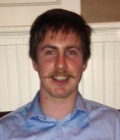
"Reprogramming Fibroblasts into Myoblasts: Creating a Regenerative Cell Therapy to Treat Muscular Dystrophy"
Host Mentor: Michelle Calos
Stanford University
The Calos lab is focused on creating therapies for the treatment of various muscular dystrophies. Muscular dystrophies are a collection of diseases characterized by increasing muscle weakness and wasting as the affected individual gets older. The most progressive and lethal of these myopathies is Duchenne Muscular Dystrophy, DMD is the result of a mutation in the dystrophin gene. This disease is sex linked, affects 1 in 3500 live male births and causes wasting to the muscles of the skeletal and cardiac systems. The dystrophin protein tethers the extra cellular matrix with the cytoskeleton of the muscle fiber. Through normal life processes muscle undergoes constant tearing and repair. The cells responsible for myofiber regeneration are called satellite cells. After muscle damage satellite cells are signaled to proliferate and differentiate into myoblasts, which then fuse with damaged fibers. DMD results in over proliferation and exhaustion of satellite cells. To combat this disease I use a novel immunocompromised dystrophic mouse model, NRG mdx4CV to show the validity of a regenerative cell therapy. Through the controlled overexpression of the muscle master gene MyoD it is possible to reprogram dermal fibroblasts into myoblasts. I do this with fluorescently labeled cells from a wild type mouse and through intramuscular injection I engraft the therapeutic cells into the Tibialis Anterior muscle of the dystrophic mouse allowing the reprogramming to occur in vivo, ameliorating the dystrophic phenotype, while also creating dystrophin producing satellite cells and thus providing a lasting remedy for duchenne muscular dystrophy.